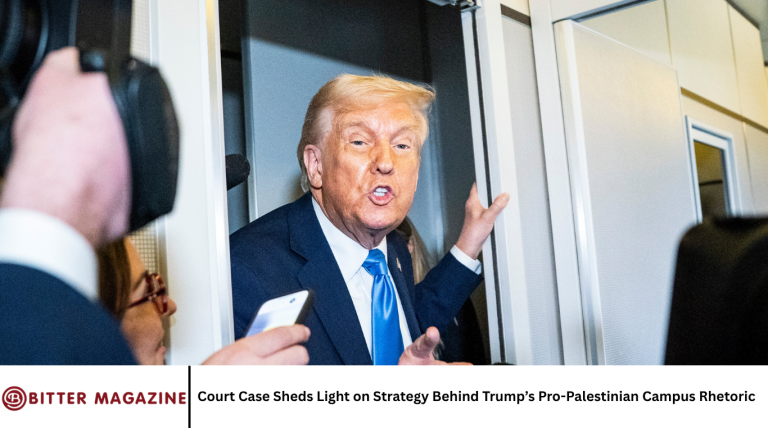In recent years, college campuses across the United States have become battlegrounds for ideological and political conflicts. Among these, the discourse surrounding the Israeli-Palestinian conflict has drawn significant attention, sparking passionate activism and equally passionate opposition. A prominent feature of this controversy has been former President Donald Trump’s public rhetoric targeting pro-Palestinian students and activists.
A recent federal trial has now pulled back the curtain on the underlying strategy behind these attacks, revealing a sprawling, coordinated plan to suppress pro-Palestinian voices on campuses. This article explores the details of the court case, the broader political context, the implications for free speech and activism, and what this means for the future of campus debates.
Background: The Campus Activism Landscape
University campuses have long been sites for social and political activism, from civil rights to anti-war protests. In the contemporary era, advocacy related to the Israeli-Palestinian conflict is a significant flashpoint. Pro-Palestinian student groups organize events, protests, and educational campaigns to raise awareness about Palestinian rights and Israeli policies.
Simultaneously, there is strong pushback from pro-Israel groups, who argue that certain pro-Palestinian activism crosses into anti-Semitism or threatens campus safety. This tension has been amplified by national politics, particularly under the Trump administration, which took a hardline stance supporting Israel.
Trump’s Rhetoric and Its Impact
During his presidency and beyond, Donald Trump frequently condemned pro-Palestinian activism, labeling it as dangerous or un-American. His rhetoric included calls to crack down on student groups, investigations into alleged anti-Semitic incidents, and public condemnation of universities perceived as harboring pro-Palestinian sentiment.
This approach had real-world consequences. Several universities altered their policies regarding campus groups, and some pro-Palestinian activists reported harassment, censorship, and surveillance. Trump’s rhetoric also emboldened conservative student groups and outside organizations to challenge pro-Palestinian voices aggressively.
The Federal Trial: An Overview
The recent federal trial centers around allegations that Trump and his associates engaged in a coordinated campaign to target pro-Palestinian students at multiple universities. The case, brought by several student plaintiffs and advocacy groups, accuses Trump of orchestrating a deliberate effort to intimidate and silence pro-Palestinian voices through public pressure, political threats, and collaboration with campus authorities.
Evidence presented during the trial included internal communications, testimonies from university officials, and social media posts from Trump and his allies. The trial showcased the extent to which these actions were planned and executed systematically, rather than being spontaneous or isolated incidents.
Key Revelations from the Trial
The trial revealed several crucial aspects of the strategy behind Trump’s campus rhetoric:
- Centralized Coordination: The campaign was not ad hoc but involved a coordinated network of political operatives, campus administrators, and conservative groups working in concert.
- Use of Media and Social Platforms: Trump and his allies utilized social media extensively to amplify accusations against pro-Palestinian activists, often bypassing traditional fact-checking.
- Pressure on Universities: There was documented pressure on university administrations to restrict or monitor pro-Palestinian groups, sometimes threatening funding or legal action.
- Targeting of Individual Students: Specific students were singled out publicly, leading to harassment and threats.
Legal and Ethical Implications
The revelations raise important questions about free speech, political influence in education, and the rights of student activists. While universities have a responsibility to maintain safe and inclusive environments, the trial highlighted the risks of political interference undermining these goals.
Legal experts debated whether Trump’s actions constituted unlawful intimidation or suppression of speech. The case also underscored the challenge of balancing anti-Semitism concerns with protecting legitimate pro-Palestinian advocacy.
Broader Political Context
The trial occurs against a backdrop of polarized American politics, where the Israeli-Palestinian conflict is deeply entwined with domestic identity politics. Trump’s hardline support for Israel energized a segment of his base but also inflamed tensions on campuses and beyond.
Moreover, the case exemplifies how national political figures can influence local campus dynamics, sometimes escalating conflicts for broader political gain.
The Future of Campus Discourse
The trial’s outcome and the public attention it has garnered may set precedents for how universities and policymakers handle contentious activism. It highlights the need for clear policies that protect free speech while preventing harassment.
Student groups on all sides face increased scrutiny, but the case also encourages activism to remain vigilant against political overreach. Constructive dialogue, rather than suppression, is essential for resolving deep-seated conflicts on campus.
Frequently Asked Question
What triggered the federal trial against Trump regarding campus activism?
Several pro-Palestinian students and advocacy groups filed a lawsuit alleging Trump orchestrated a campaign to intimidate and silence their voices on campuses.
How did Trump allegedly target pro-Palestinian students?
Through public rhetoric, social media posts, political pressure on universities, and coordination with conservative groups and campus officials.
What are the legal issues involved in the case?
The case raises questions about free speech, political intimidation, and whether Trump’s actions violated students’ rights to peaceful activism.
How have universities responded to the controversy?
Some universities tightened policies on campus groups; others reaffirmed commitments to free speech but faced pressure from political figures.
What is the broader impact of this trial?
It highlights the politicization of campus activism and may influence future policies protecting student activists’ rights.
Does this case affect only pro-Palestinian groups?
While focused on pro-Palestinian activism, the case has implications for all student groups advocating controversial political causes.
What can students do to protect their rights on campus?
Students should stay informed about their rights, document incidents, seek legal support if necessary, and engage in open dialogue with university officials.
Conclusion
The federal trial revealing the coordinated campaign behind Trump’s attacks on pro-Palestinian students sheds light on the complex intersection of politics, activism, and free speech on American campuses. It underscores the high stakes of campus activism and the powerful influence of national political narratives in shaping local experiences.As the nation watches the trial’s developments and its aftermath, the broader question remains: How can universities foster environments where diverse voices are heard without fear of political retaliation? The answer may shape the future of activism and discourse for years to come.
